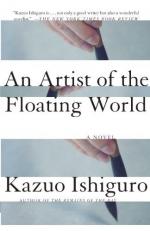
|
| Name: _________________________ | Period: ___________________ |
This test consists of 5 short answer questions, 10 short essay questions, and 1 (of 3) essay topics.
Short Answer Questions
1. What is the mood of Moriyama's paintings?
2. Why does the smell of burning make Ono uneasy?
3. Why does Ono admire Sugimura?
4. What traits does Ono observe that Ichiro has inherited from his mother?
5. What does Ono say during lunch that frightens Ichiro?
Short Essay Questions
1. Why does Ono admire Sugimura's work on Kawabe Park, even though Sugimura failed to accomplish his goals?
2. Why does Matsuda say he never married?
3. What European influences distinguished Moriyama's work from Utamaro's?
4. What stylistic devices does Moriyama copy from the classic artist, Utamaro?
5. What does Matsuda say about his own perspective now that he is old and ill?
6. How does Ono believe a teacher should regard his students diverging from his teachings?
7. What effect did Moriyama try to create in his paintings?
8. How does Ono console himself that he did not visit his old friend as often as he had intended to?
9. What do we learn about Setsuko from Ono's conversation with Matsuda?
10. Years ago, Matsuda had accused Ono of having a narrow artist's perspective. What does Ono say about his perspective now that he is retired?
Essay Topics
Write an essay for ONE of the following topics:
Essay Topic 1
What difference do you see in the way Ono interacts with his daughters and his grandson and the way Noriko describes his earlier behavior as a father? Do you trust her description? Do you think he has changed? Analyze Ono's development as a father based on his daughters' responses to him.
Essay Topic 2
Twice in the story, authority figures burned Ono's paintings. Compare the two situations. Did they have the same purpose? Were they trying to help the young man or hurt him? How do you know? Use textual evidence to support your opinion.
Essay Topic 3
At the miai, Saito suggests that boys should not be confined, but should be allowed to run free even when they hurt themselves. He uses this as an argument in support of the street demonstrations which he views as legitimate use of freedom of speech. The maturation of boys to men is a significant theme in this story. The men, from Matsuda arguing with his caregiver, Suzuki, to Ono's arguments with his daughters about Ichiro seeing a scary movie and drinking sake, argue for freedom and the women urge restraint and greater care. Using examples from the text, select one character and write about their maturation process. Ichiro, Kenji, Kuroda, or Ono himself would be good possibilities. Are these developing men symbols of their country as a whole? is it, as Taro Saito suggests, a baby democracy learning how to govern itself?
|
This section contains 743 words (approx. 3 pages at 300 words per page) |

|




